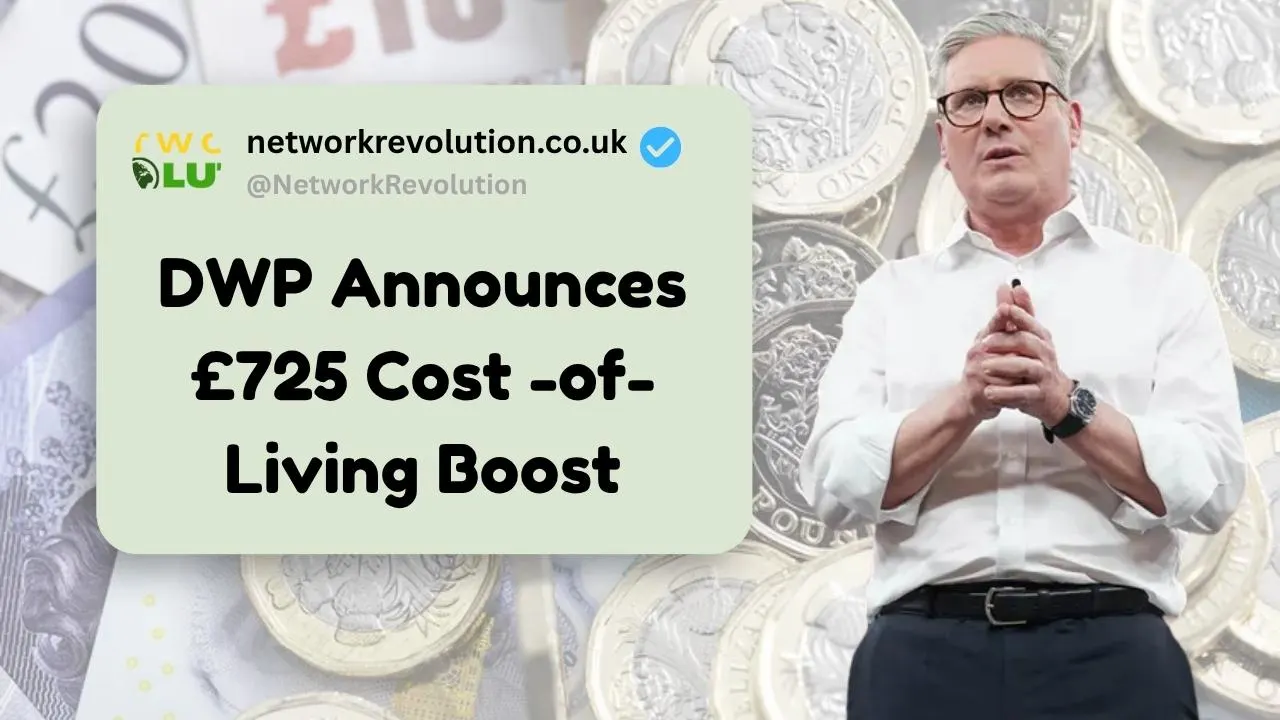The DWP recent announcement of a £725 increase to Universal Credit has sparked confusion and hope in equal measure. Far from being a short-term “cost-of-living payment,” this uplift is a structural change to the welfare system, designed to help support lower-income households over the long term. Nearly 4 million recipients are expected to benefit—but timing, eligibility, and impact differ from what many had assumed.

Introduction to the Boost: What It Really Is?
On 9 July 2025, the Government published a DWP press release stating that about 4 million households will receive a £725 annual boost to the Universal Credit standard allowance once reforms roll out.
Key points:

- This is not a one-off “cost-of-living payment.”
- The increase will be phased in, beginning April 2026.
- The change comes as part of a broader Universal Credit Bill that passed its Commons stage.
So while many had anticipated a lump-sum payment, the official policy is a permanent uplift to the ongoing benefit rate.

Key Features / Overview
- Amount: £725 added to the annual standard allowance for UC
- Rollout start: April 2026 (new allowance phase begins)
- Scope: Mainly working-age Universal Credit claimants
- Adjustment method: The boost will raise the baseline, not a separate payment
- Other benefits interaction: The uplift is intended to be neutral in effect on housing, childcare, and health elements
Eligibility Rules
Not everyone on Universal Credit will necessarily see the £725 increase immediately or under the same conditions. Here’s what current announcements and texts suggest:

- Automatic for existing recipients — If you are already receiving Universal Credit, the increase should apply once the reforms kick in.
- Linked UC-related benefits included — The reforms mention that those on legacy benefits tied to UC will also be considered in the change.
- No extra application required — As part of the Bill, existing claimants are expected to transition automatically to the higher standard allowance.
- Income and capital thresholds still apply — Standard rules of Universal Credit eligibility remain in force (income, savings, etc.)
Benefits of the Uplift
- Stronger baseline support — Instead of a one-off, the boost becomes part of your monthly entitlement.
- Greater certainty — Households can plan knowing that their core benefit has been raised above inflation.
- Reduced top-up demands — It lessens the reliance on extra crisis payments or benefit advances.
- Fairness for long-term recipients — It helps restore value eroded through benefit freezes or rising costs over time.

Payment/Processing Details
| Aspect | Detail |
|---|---|
| Boost Type | Increase to standard allowance, not separate lump-sum |
| Start Date | April 2026 for new rate implementation |
| Payment Frequency | Paid monthly as part of UC entitlement |
| Bank Details | Uses same accounts already registered for UC |
| Application | No action required by claimants for transition |
Comparison / Extra Insights
- Unlike prior Cost of Living Payments (2022–2024), which were discrete lump sums, this is built into UC structure.
- Previous C-of-L Payments were non-taxable and non-affecting benefits; this uplift is similar in design intent but changes core rates.
- Some media reports misstate it as a one-off “£725 payment in 2025,” but government texts clarify the boost phases in and becomes part of the allowance from 2026 onward.
Recent Updates & Timeline
- July 2025 — DWP officially confirms the £725 boost and that it will be part of UC reform.
- April 2026 — Implementation begins; claimants start receiving the higher allowance.
- 2029/30 — The boost is expected to be fully embedded, ensuring “above-inflation” growth over several years.
- The Universal Credit Bill — Now in the House of Lords; final changes and amendments may still occur.
Why It Matters?
This shift matters because it changes how benefit support is structured — from reactive payments to reinforcing the foundation of Universal Credit.
- For families and claimants: It offers more stable, predictable support.
- For policy shifts: It signals a long-term commitment to maintaining benefit levels above inflation.
- For inequality: By raising the base level, the government reduces reliance on supplementary support that often favors those better able to apply and navigate the system.
FAQs
Is this £725 boost a one-off payment in 2025?
No — it is a permanent uplift to the Universal Credit standard allowance, beginning in April 2026.
Who will benefit from this uplift?
Primarily people on Universal Credit and those on related UC-linked benefits. Nearly 4 million households are expected to see the change.
Do I need to apply?
No — existing claimants should be transitioned automatically.
Will it reduce my other benefits (housing, childcare, etc.)?
The policy intends the uplift not to affect those additional elements of your Universal Credit award.
When will I start seeing the increase?
April 2026 is the planned date for the new allowance to take effect.

